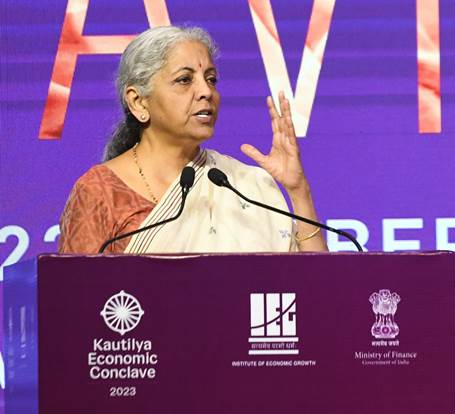
Union Finance Minister Smt. Nirmala Sitharaman addressed the Inaugural Plenary session on ‘Navigating a World on Fire’ at the Kautilya Economic Conclave -2023, organised by the Institute of Economic Growth in association with the Ministry of Finance, in New Delhi today.

Sharing achievements of the Government led by Prime Minister Shri Narendra Modi, the Finance Minister highlighted India’s success in creating Digital Public Infrastructure and the resultant financial inclusion the country has witnessed. She also touched upon the need for committed efforts to tackle important global issues like Climate financing and Global Terror. During her address, Smt. Sitharaman also highlighted key takeaways from the G20 Finance Track under India’s Presidency.
Speaking during the Plenary session, the Union Finance Minister said, “The impact of terrorism across the globe is no longer an occasional one and no one region is spared. With that level of risk or uncertainty coming into business decision-making, investments will face uncertainty and high risk permanently.” Businesses can no longer be just attracted by policies or by the openness of an economy. The risk that the investors and businesses will have to factor into their decision-making is going to be strongly influenced by the impact of global terror, Smt. Sitharaman added.
On the focus of the Government of India on empowering citizens through digitisation, Union Finance Minister said, “India is opening up and bringing greater transparency through the digital economy. There’s no more powerful tool than Digitisation to empower citizens, who otherwise would’ve remained very far from their developmental aspirations being met.”
Speaking on the Financial Inclusion programme of the Government of India, Smt. Sitharaman said, “Jan Dhan Accounts have been the biggest instrument of bringing financial inclusion to the country. When it was launched in 2014, people raised questions, saying that these would be zero-balance accounts and would be a burden on the Public Sector Banks (PSBs). Today, these Jan Dhan Accounts have total balance of more than Rs 2 lakh crore.” During COVID-19, due to these Jan Dhan Accounts, the poorest of the poor received money in their accounts from the government to fulfill their essential needs, the Union Finance Minister said.
On maintaining the aspirations of the fastest-growing economy in the world with focus on environment sustainability, Smt. Sitharaman said, “Under the leadership of Shri Narendra Modi, India used its own resources to fulfill its Nationally Determined Commitments (NDCs) as outlined in the Paris Agreement. Anyone suggesting that this should be an obvious course of action must also consider that developing countries may not have the financial capacity for such significant climate financing.”
“Consider a country like India, where developmental goals and aspirations are being achieved at an unprecedented pace and where a significant portion of the population still requires support. The question arises: Where will the necessary funds come from?”, the Union Finance Minister asked.

Highlighting the work of G20 Presidency under India, Smt. Sitharaman said that the agenda of the G20 Finance Track was chosen on considerations which are global, including –
- Readying Multilateral Development Banks (MDBs) for 21st Century challenges.
- Regulating crypto assets.
- Debt distress due to lack of timely action by international institutions.
- Funding of futuristic cities.
- Success of India’s Digital Public Infrastructure (DPI).
- Two-Pillar solution on Taxation issues.
“Each one of these agenda points found a very good resonance in the G20 Presidency under India”, the Union Finance Minister added.
Shri N.K. Singh, President, Institute of Economic Growth and Mr. Jean-Pierre Landau, Associated Professor of Economics at Sciences Po (Paris) and Research Fellow at the Harvard Kennedy School, France, also participated in the Inaugural Plenary Session.
****
NB/VM/KMN



